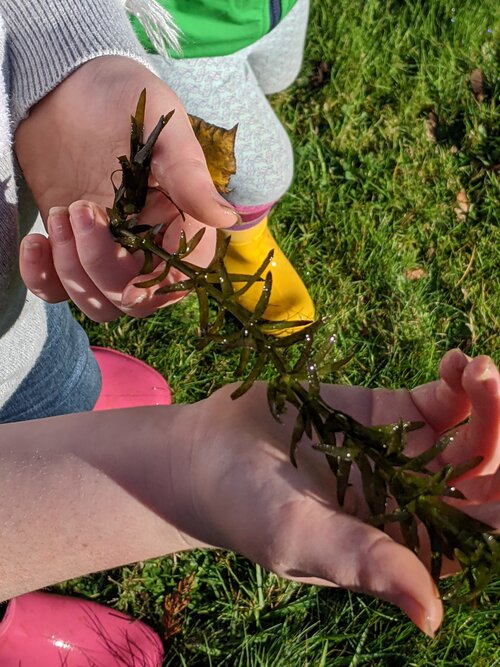King County, Duvall to share plans for controlling spread of fast-growing aquatic weed in Lake Rasmussen at July 21 open house
Summary
King County noxious weed experts and the City of Duvall are hosting an open house on July 21 to share with the community plans for controlling Egeria – a quick spreading aquatic noxious weed discovered growing in Lake Rasmussen last year.
Story
A fast growing and quick spreading noxious weed discovered last year in Duvall’s Lake Rasmussen requires immediate attention to prevent it from spreading into the Snoqualmie River and elsewhere in the greater watershed.
spreading noxious weed discovered last year in Duvall’s Lake Rasmussen requires immediate attention to prevent it from spreading into the Snoqualmie River and elsewhere in the greater watershed. The King County Noxious Weed Program and City of Duvall are hosting a community open house on July 21 at Lake Rasmussen Park from 6:30 to 7:30 p.m., when experts will explain the impacts of the noxious weed Egeria densa, how people can prevent spreading it further, and the scope of work to eradicate it from the lake.
The Lake Rasmussen population is the first known occurrence of the Class B Noxious Weed in the Snoqualmie Watershed. Also called Brazilian elodea, Egeria becomes so abundant underwater that it can fill the entire water column. Egeria’s dense growth leaves little room for fish or beneficial vegetation, significantly reducing the fish habitat and recreational value of a lake or river.
Lake Rasmussen Park is located at the corner of Fourth Avenue Northeast and Northeast Cherry Street. More information about the open house is available by contacting Ben Peterson, King County Noxious Weed Control Program, 206-477-4724; or Alana McCoy, City of Duvall, 425-939-8045.
It isn't known how Egeria got to Lake Rasmussen, but this plant is often spread by small fragments carried on boats or from fish aquariums emptied into lakes. To keep Egeria from spreading, visitors to Lake Rasmussen and other infested areas should clean off their boots, boats, and dogs before leaving.
Because the Egeria is still limited in the watershed, aquatic plant experts with King County and the State of Washington believe that there is a small window of opportunity to eradicate it from the lake and prevent it from spreading downstream.
After consulting with tribes, fish biologists, state agencies, conservation organizations, lakeside residents, and local stakeholders, King County and Duvall developed a rapid response plan to treat the Egeria this summer, and if needed, again next year.
King County has received approval to control the Egeria, a Class B Noxious Weed in Washington, through Ecology’s Aquatic Plant and Algae Management General Permit. The permit allows a licensed aquatic weed control contractor to treat the lake with a safe herbicide to hopefully eradicate the Egeria plants. The herbicide applicator will treat half the lake at a time, and the treatment dates are scheduled for Aug. 3 and Aug. 18.
Signs will be posted around the lake and adjacent landowners will be notified two days before each treatment. Diquat is a contact herbicide that is highly effective on Egeria but has less impact on native lake vegetation.
There are no fishing or swimming restrictions associated with diquat herbicide, and the chemical does not move into the groundwater. There are restrictions for irrigation and drinking that last up to five days. Although the lake water is not known to be used for these purposes, the lake will be closed with signage posted to educate the public.
The City of Duvall is receiving funding from the Cooperative Watershed Management Grant Program to help pay for half of the Egeria treatments. Funding for the other half of the cost will come from the King County Noxious Weed Control Program.
RELEVANT LINKS
• Egeria
• King County Noxious Weed Program
FOR MORE INFORMATION, CONTACT:
Doug Williams, 206-477-4543
About the King County Water and Land Resources Division
The Water and Land Resources Division works to protect the health and integrity of King County’s natural resources. Employees work to reduce flood risks, monitor water quality and restore wildlife habitat; manage, and reduce the harmful impacts from stormwater, noxious weeds and hazardous waste; create sustainable forestry and agriculture; and protect open space to support all of these efforts.

 Translate
Translate